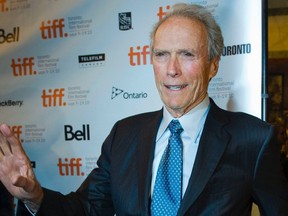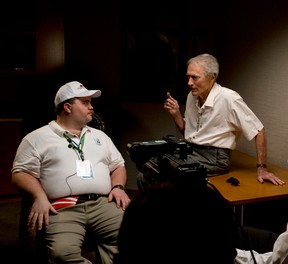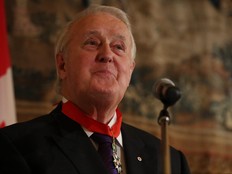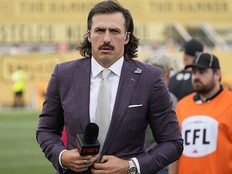Clint Eastwood at 95: Oscar winner has no plans to retire
'There’s no reason why a man can’t get better with age'

Article content
UPDATE: Clint Eastwood has released a statement saying that he never spoke to a reporter from Kurier
Clint Eastwood has no plans to stop making movies.
After industry insiders speculated that the legendary Hollywood star was planning to retire after directing last year’s legal thriller Juror #2, Eastwood says in a new interview that he isn’t looking to slow down anytime soon.
“There’s no reason why a man can’t get better with age,” Eastwood, who turned 95 on Saturday, told Austrian newspaper Kurier, per Fox News. “And I have much more experience today. Sure, there are directors who lose their touch at a certain age, but I’m not one of them.”
After hopping from job-to-job, acting in a series of bit parts in the early 1950s, Eastwood first found fame on television’s Rawhide where he played Rowdy Yates for seven seasons from 1959 to 1965.
In the 1960s, he became a big screen star as The Man With No Name in Sergio Leone’s Italian westerns, which included 1964’s A Fistful of Dollars, 1965’s For a Few Dollars More, and 1966’s The Good, the Bad and the Ugly.
During the ’70s, Eastwood’s hit streak continued with Dirty Harry, the action comedy Every Which Way But Loose, Escape from Alcatraz, The Outlaw Josey Wales, Thunderbolt and Lightfoot, his first directorial effort Play Misty For Me, and more.
Eastwood made a handful of sequels, starring in three more Dirty Harry movies and a follow-up to Every Which Way But Loose (titled Any Which Way You Can). But in his chat with Kurier, he bemoaned Hollywood’s penchant for wanting to turn every successful film into an ongoing series.
“I long for the good old days when screenwriters wrote movies like Casablanca in small bungalows on the studio lot. When everyone had a new idea,” he said. “We live in an era of remakes and franchises. I’ve shot sequels three times, but I haven’t been interested in that for a long while. My philosophy is: Do something new or stay at home.”

The four-time Oscar-winning director of 1992’s Unforgiven and 2004’s Million Dollar Baby said that he plans to keep working “for a long time yet” and credited his early years as a struggling actor for helping him learn how to adapt.
“As an actor, I was still under contract with a studio, was in the old system, and thus forced to learn something new every year,” Eastwood explained. “And that’s why I’ll work as long as I can still learn something, or until I’m truly senile.”
Eastwood continued to work steadily throughout the 2000s, 2010s and into the 2020s, directing such films as Invictus (2009), Hereafter (which premiered at the Toronto International Film Festival in 2010), J. Edgar (2011), and last year’s Juror #2. He also kept acting, appearing in 2008’s Gran Torino, The Mule (2018) and Cry Macho (2021) — all three of which he directed.
The father of eight said that one of the keys to his longevity was the fact that he wasn’t afraid to take on new challenges.
“I didn’t repeat myself, I didn’t always make the same kind of film, I always tried something new,” he said. “A new genre, a different role.”

He also credited his positive outlook with helping him weather his career downturns.
“I always knew that you can get further with a positive attitude to life than with a negative one,” he said. “You shouldn’t see the glass as half empty. And I had that feeling when I was 25, as an aspiring actor who was contemptuously told by numerous producers that I was a failure. I even heard a little voice inside me back then that said you could do it.”
More recently, some of Eastwood’s films like American Sniper, Sully, The 15:17 to Paris and Richard Jewell have focused on real-life heroes.
“I just enjoy them as stories and I can see them as I’m reading it,” Eastwood told Postmedia in a 2019 interview.
His work on Richard Jewell, which told the story of how the security guard was wrongly accused in the 1996 bombing at the Summer Olympics, was a “good example of that.”

“How could someone get screwed over so bad? There have been many cases in life that have gone that way, but it’s so odd. One day you’re on top of the world and the next day you’re at the bottom of the heap,” he said.
Eastwood also shared a piece of advice he got early on in his career that guided him through the rest of his work as a filmmaker.
“I was making my first picture as a director, Play Misty for Me, and (director) Don Siegel said to me, ‘I just got one thing to say: Don’t short yourself.’ I remember thinking, ‘What does that mean?’ And it was to be considerate, but don’t think your own happiness doesn’t matter. You’ll be accused of being egotistical, but don’t worry about that. Just don’t short yourself.
“Make yourself the best you can be,” Eastwood added. “That was good advice.”













Postmedia is committed to maintaining a lively but civil forum for discussion. Please keep comments relevant and respectful. Comments may take up to an hour to appear on the site. You will receive an email if there is a reply to your comment, an update to a thread you follow or if a user you follow comments. Visit our Community Guidelines for more information.